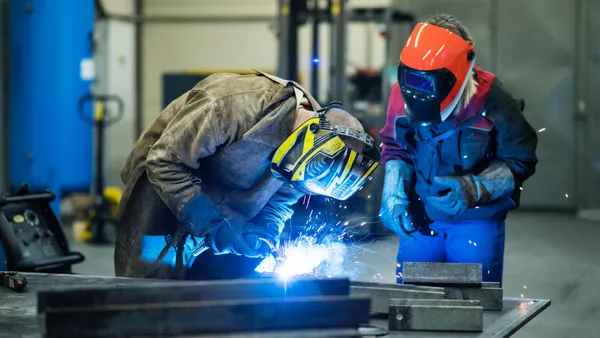Dive Brief:
- Vermont employers looking to operate during the state's state of emergency for the COVID-19 pandemic will need to have their employees complete a mandatory health and safety training, according to an executive order signed April 24 by Gov. Phil Scott.
- The training will be developed by state agencies and will cover the signs and symptoms of COVID-19; appropriate social distancing and personal hygiene practices; and the types, proper use, limitations, location, handling, decontamination, removal and disposals of any personal protective equipment used. In a May 6 addendum, Scott said Vermont businesses with more than 10 employees would need to develop a training plan that augments the agencies' training standards with "additional policies and procedures customized to the unique nature of the entity or sector-specific employment environment."
- The order exempts from its training requirements healthcare workers, first responders and other workers trained in infection control, personal protections and universal precautions.
Dive Insight:
Vermont is one of many states that have gradually phased in the reopening of businesses in May, according to The New York Times. Scott announced in a May 6 press release that the state would allow outdoor recreation and limited social interactions to resume with health and safety precautions.
Most employers are still working on their return-to-work strategies, a survey this month from law firm Blank Rome found, and the picture of a typical post-pandemic workplace is beginning to emerge based on those strategies. For example, 83% of employers surveyed by Blank Rome said they were more open to increasing remote-work options, and 52% said they planned to maintain social distancing at work. A majority (64%) said they planned on conducting some form of medical testing for employees.
That tracks with recommendations from employment law experts. Attorneys with Cozen O'Connor said in an April webinar that employers should, in accordance with federal re-opening guidelines, conduct procedures like temperature checks as well as create policies around social distancing, protective equipment use, sanitation and employee travel, among others. The presenters noted that workers may be fearful of returning even if they do not belong to a population that is particularly vulnerable to COVID-19, which may create discrimination concerns.
The latter point may be important for employers to keep in mind as more than half of U.S. workers are reportedly worried about COVID-19 exposure on the job, according to an April survey by Eagle Hill Consulting. Most employers will rely on state and local governments, in addition to scientific experts and internal experts, as they reopen their worksites, a survey last month by outplacement firm Challenger, Gray & Christmas found.













